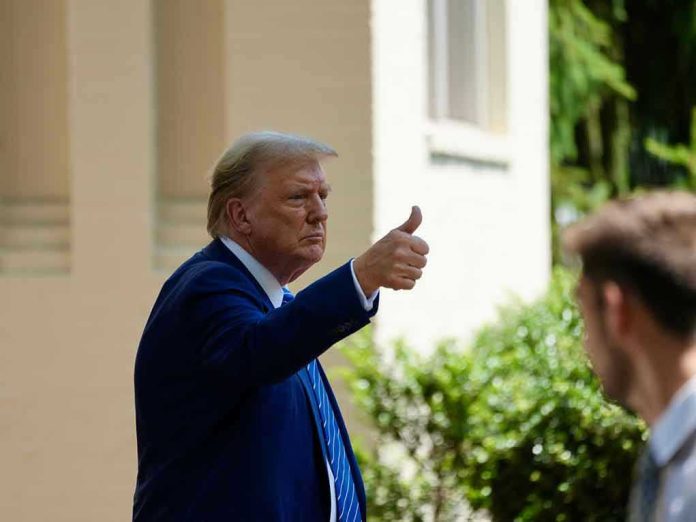
When the President of the United States asks a foreign leader to take back a sitting U.S. Congresswoman, you know American politics has reached a new level of audacity.
Story Snapshot
- Trump claimed he asked Somalia’s president to “take back” Congresswoman Ilhan Omar during recent diplomatic talks
- The Somali leader allegedly refused, saying “I don’t want her,” according to Trump’s account
- The exchange occurred after Omar criticized late conservative activist Charlie Kirk
- The comment was delivered as humor during an Oval Office briefing but sparked immediate controversy
A Diplomatic Joke That Wasn’t Funny to Everyone
During his Oval Office briefing, President Trump recounted what he claimed was a recent conversation with Somali President Hassan Sheikh Mohamud. Trump described asking the foreign leader if he would “like to take” Congresswoman Ilhan Omar back to Somalia. The room erupted in laughter when Trump revealed the alleged response: “I don’t want her.” But the chuckles quickly turned into a political firestorm that exposed deep divisions about immigration, identity, and acceptable political discourse.
The timing wasn’t coincidental. Omar had recently made critical remarks about Charlie Kirk, the conservative activist who passed away, triggering Trump’s latest verbal assault. High-profile officials including Vice President J.D. Vance, FBI Director Kash Patel, and White House Press Secretary Caroline Leavitt witnessed the exchange, lending an official air to what Trump framed as diplomatic banter.
The Pattern Behind the Provocation
This isn’t Trump’s first rodeo with telling Omar to leave America. In 2019, he infamously tweeted that she and other congresswomen of color should “go back” to their countries, earning widespread condemnation for xenophobic rhetoric. The latest incident follows the same playbook but with a diplomatic twist that makes it particularly provocative. Trump’s strategy appears designed to energize his base while painting Omar as unwanted both at home and abroad.
Omar, one of the first Muslim women elected to Congress and a Somali refugee who became a U.S. citizen, represents everything Trump’s immigration rhetoric targets. Her progressive positions and outspoken criticism of conservative figures make her a perfect foil for Trump’s political theater. Yet involving a foreign head of state in domestic political attacks crosses traditional diplomatic boundaries and raises questions about the appropriateness of mixing international relations with partisan warfare.
When Humor Becomes a Political Weapon
Trump’s defenders will undoubtedly claim this was just another example of his unconventional humor, pointing to the laughter in the room as evidence of harmless banter. However, political communication experts warn that using comedy to mask exclusionary rhetoric doesn’t make it less harmful. The “it’s just a joke” defense has become a common shield for increasingly provocative political statements that would have been career-ending scandals in previous eras.
The broader implications extend beyond hurt feelings or political point-scoring. When American leaders suggest that naturalized citizens should be returned to their birth countries based on political disagreements, it undermines the fundamental principle that citizenship means belonging. This rhetoric particularly impacts immigrant communities who may already feel politically vulnerable, regardless of their legal status or length of residence in America.
The Diplomatic Dimension Nobody Wants to Discuss
Perhaps most troubling is the casual way Trump claimed to involve Somalia’s president in American domestic politics. If accurate, the exchange puts the Somali leader in an impossible position: appearing to reject one of his former citizens could damage his standing at home, while defending Omar might complicate crucial diplomatic relationships with the United States. The lack of any official response from Somalia’s government speaks volumes about the diplomatic awkwardness Trump’s comments created.
This incident reveals how Trump’s political style continues to blur traditional boundaries between domestic politics and international diplomacy. While his supporters may applaud the directness, the long-term consequences for America’s relationships with immigrant-origin nations and our global reputation for inclusive democracy remain unclear. What’s certain is that when political theater involves real diplomatic relationships, the jokes stop being funny very quickly.
Sources:
Trump suggests Somali president ‘take back’ Rep. Ilhan Omar after she trashed Charlie Kirk’s legacy









